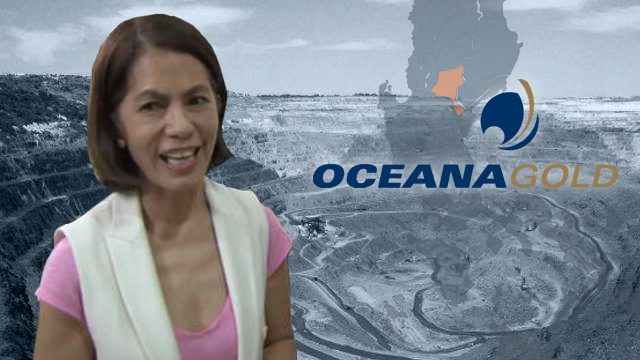SUMMARY
This is AI generated summarization, which may have errors. For context, always refer to the full article.

ISABELA, Philippines – Environment Secretary Gina Lopez promised to cancel the permit given to Australian mining firm OceanaGold Philippines Inc. to extend its explorations in a remote town in Nueva Vizcaya province.
In a phone interview, Nueva Vizcaya Governor Carlos Padilla quoted Lopez saying she would ask Mines and Geosciences Bureau (MGB) Director Leo Jasareno to act on the cancellation the extension of the exploration permit of the OceanaGold to stop the “suffering” of the communities in Didipio village in Kasibu town.
“That was her statement to us when we had a dialogue last Wednesday, July 20, in Makati, but she said… they had to go to a short process, which I think is what she is doing,” Padilla told Rappler on Sunday, July 24, saying Lopez told him that the cancellation of the permit is already a “done deal.”
The MGB, in March, granted OceanaGold a 5-year extension to the exploration period of its Financial or Technical Assistance Agreement (FTAA) in the Philippines.
‘Warm-bodies barricade’
Community members and various groups had been barricading the entry of the equipment for explorations of the OceanaGold in Didipio town for over a month now.
Padilla said the barricade succeeded and even forced OceanaGold to pull out some equipment that were already in placed in the exploration site.
But he said he “would not let the communities to barricade forever” so they asked Lopez to cancel the extension of the exploration permit, so the people could “peacefully” go home to their houses.
“The people couldn’t leave the barricade because of the fear that the mining company might enter any time,” Padilla said.
For Lopez, who is a known anti-mining advocate, there should have been no permit issued since there was no public consultation.
“I promise I will not let you suffer anymore,” Lopez was quoted telling various community leaders, environmental groups and officials of the provincial government of Nueva Vizcaya during their meeting.
To formalize their dialogue, Lopez asked Padilla to write a letter asking for the cancellation of the firm’s exploration permit.
‘Anti-mining community’
Townspeople have long been opposing the mining in the area and even complained of human rights abuses of the mining firm.
Padilla said the agencies concerned had been “insensitive” about the complaints of the communities affected by the firm’s operations.
In his letter to Lopez, Padilla said the communities “oppose mining because it would disrupt they way of life; destroy their environment and source of income; and it will provide suffering, social divisiveness.”
In 2015, several international human rights groups conducted a solidarity investigation mission on the reported abuses.
“The local people, and with environmental campaigners and scientific technicians, told me their story in their words, of coercion, corruption, abuse, destruction, injustice and robbery of the mining firm,” Sean Hawkey, one of the evaluators, said.
‘Absolute NO to mining’
Padilla said he already filed a bill to declare Nueva Vizcaya as “No Mining Zone” when he was congressman.
The bill was approved at the House of the Representatives but was stuck in the Senate when Senator Loren Legarda, who was chair of the Committee on Environment, swapped chairmanship with Senator Francis Escudero, who was the chairman of the Committee of Finance.
He said that Nueva Vizcaya should be protected since it is a major tributary of the major dams in Luzon, including the Ambuklao, Magat, San Roque, Pantabangan, Casecnan, and Binga dams.
Explaining why he is “absolute [saying] no to mining,” Padilla said that there are loopholes in the term “responsible mining.”
“The infrastructure for responsible mining is not yet in place. If I were to interpret, the rules, the regulations and the laws in place in the moment is not yet enough to ensure responsible mining,” he said. – Rappler.com
Add a comment
How does this make you feel?





There are no comments yet. Add your comment to start the conversation.